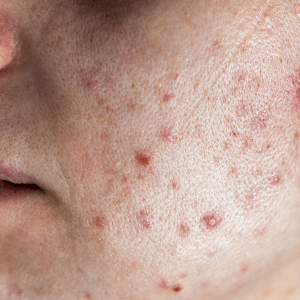At Skinvae, we understand how inflamed acne can impact your confidence and quality of life
Whether you’re dealing with deep, sore pimples under the skin or angry pustules that seem to appear overnight, inflamed acne is more than a surface level concern. It’s a skin condition that involves complex processes happening underneath the skin and that’s exactly where our expertise comes in.
Let’s break down what inflamed acne actually is, the underlying causes, and how we help our clients manage and heal their skin through both professional treatments and at-home care.
What is Inflamed Acne?
Inflamed acne appears as red, swollen, and often painful pimples. You might notice a mix of surface-level breakouts (pustules) and deeper nodules, papules, or cysts that don’t come to a head. These breakouts form within the pilosebaceous unit, your hair follicle and oil gland and typically show up in areas of high oil production like the face, jawline, upper neck, chest, and back.
While acne can look like a sudden flare-up, it’s often the result of processes that began beneath the skin weeks or even months earlier.
The Four Key Contributors to Inflamed Acne1. Excess Sebum Production & Oil Quality
Hormonal shifts (like puberty, stress, or imbalances) increase the production of thick, waxy oil in the skin. This traps debris inside the follicle, forming what we call microcomedones, tiny blockages that can eventually turn into inflamed acne. The oil itself becomes a perfect environment for acne-causing bacteria.
2. Retention Hyperkeratosis
In a healthy skin cycle, dead skin cells shed naturally. In acne-prone skin, those cells become sticky and don’t shed properly. This “stickiness” is often due to a lack of hydration and essential fatty acids. Without enough water in the skin, a natural enzyme called Stratum Corneum Chymotryptic Enzyme can’t function properly, causing dead cells to build up and clog pores.
3. P. Acnes Bacteria and Inflammation
Everyone has P. acnes bacteria on their skin. But in acne-prone skin, blocked follicles give the bacteria an all-you-can-eat buffet of oil and dead skin cells. As the bacteria break these down, they produce lipase, a highly inflammatory by-product that causes redness, swelling, and pain.
4. An Impaired Skin Barrier
Over-exfoliation, harsh products, and alkaline ingredients can damage the skin’s barrier. Without that barrier, moisture escapes, enzymes shut down, and pores clog. This sets off a chain reaction that leads to more breakouts and inflammation.
Lifestyle Tips for Managing Inflamed Acne
While in-clinic treatments and prescribed skincare are essential, what you do at home makes a big difference. Here are some top tips from the Skinvae team:
Go easy on exfoliation. Use a gentle Micro Peel 1–2 times a week as prescribed. Avoid physical scrubs and harsh acids.
Hands off. Touching or picking at your skin can worsen inflammation and spread bacteria.
Ice it. Apply an ice cube to inflamed areas for a few minutes each night to calm redness.
Treat from within. Support your skin with internal supplements like essential fatty acids, zinc, and stress-balancing formulas.
What to Avoid
Inflammatory foods (sugar, dairy, peanuts, wheat, fast food, seaweed, iodine-rich foods)
High-dose biotin, vitamin B12, and prenatal supplements if not recommended
Harsh products (micellar waters, over-the-counter benzoyl peroxide, granular scrubs)
Fabric softeners and leave-in conditioners
Excessive sun exposure
Skinvae’s home prescriptive recommendations
We often recommend our clients follow a weekly at home routine that includes:
Micro Peel + Acu Masque for gentle exfoliation and oil absorption
Red Vein Crème + Enzyme Mask to reduce redness and rebuild skin strength
Acu Therm as a spot treatment for inflamed areas
Hydrating and barrier-repair products with essential fatty acids, minerals, and vitamins
In-Clinic Treatments at Skinvae
For lasting results, we pair professional products with specialised skin therapy:
DMK Enzyme Therapy (with targeted exfoliants)
LED Light Therapy to reduce inflammation
Dermapen treatments for post-acne scarring
Our Prescribed Home Products
Every product in your Skinvae prescription is selected to support your skin barrier, regulate oil flow, reduce inflammation, and fight acne-causing bacteria. This includes:
Cleansers: Deep Pore, Acu Klenz, Acne Wash
Serums & Drops: Beta Gel, Acu Klear, Melanotech Drops, Pore Reduction Drops
Mists & Moisturisers: Acu Mist, Acu Moist
Night Treatments: Revitosin, Red Vein Crème
Specialty Products: Acu Therm, Acu Mask, Micro Peel
The Bottom Line
At Skinvae, we know that inflamed acne isn’t something you can fix overnight—and it isn’t something you should have to manage alone. Our approach is layered: barrier repair, internal health, prescribed skincare, and targeted in-clinic treatments.
Inflamed acne can absolutely be cleared, but it takes a personalised, consistent, and holistic approach. If you’re struggling with acne and want expert guidance, book a consultation with one of our Skin Therapists today.
Let’s clear the confusion and your skin.
Skinvae | Skin Health Starts Within


